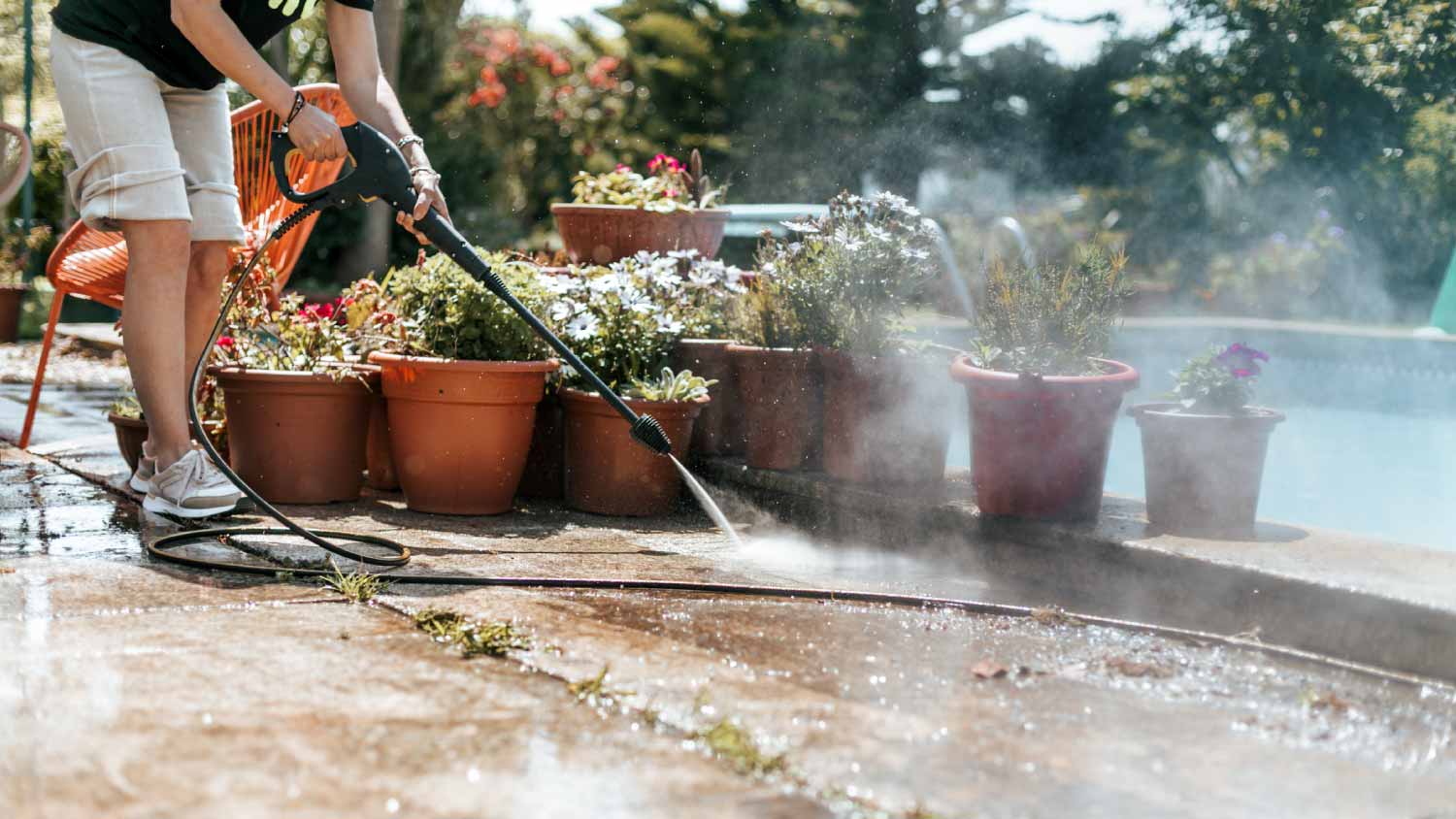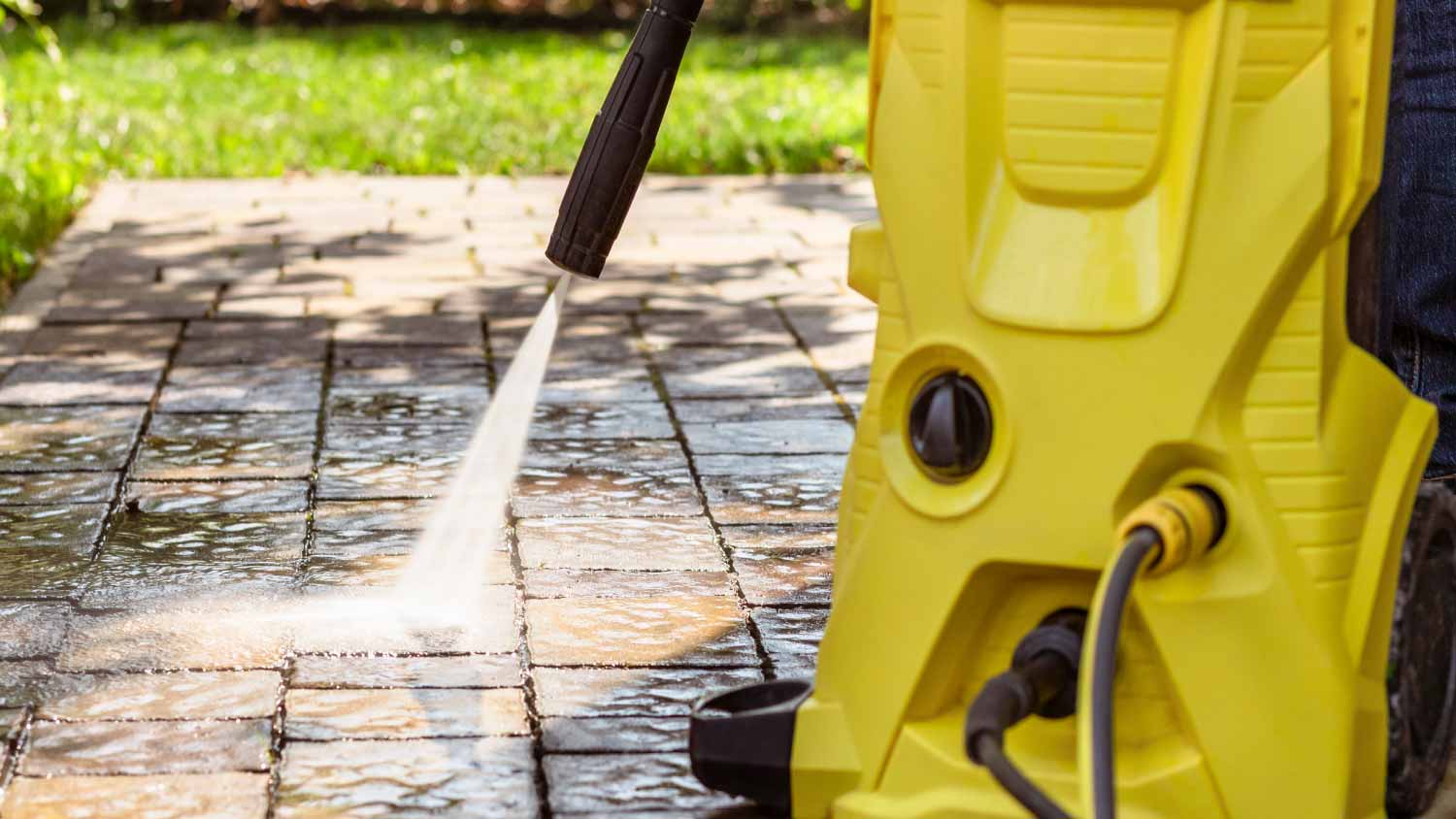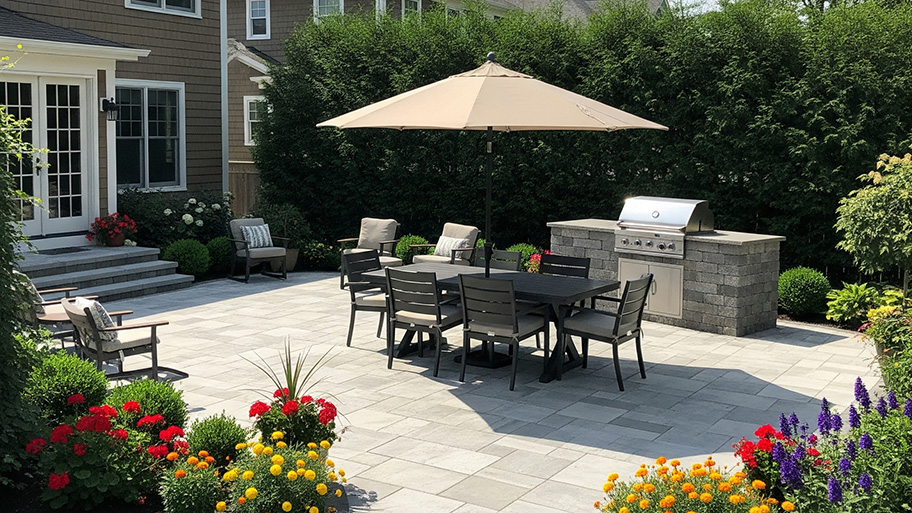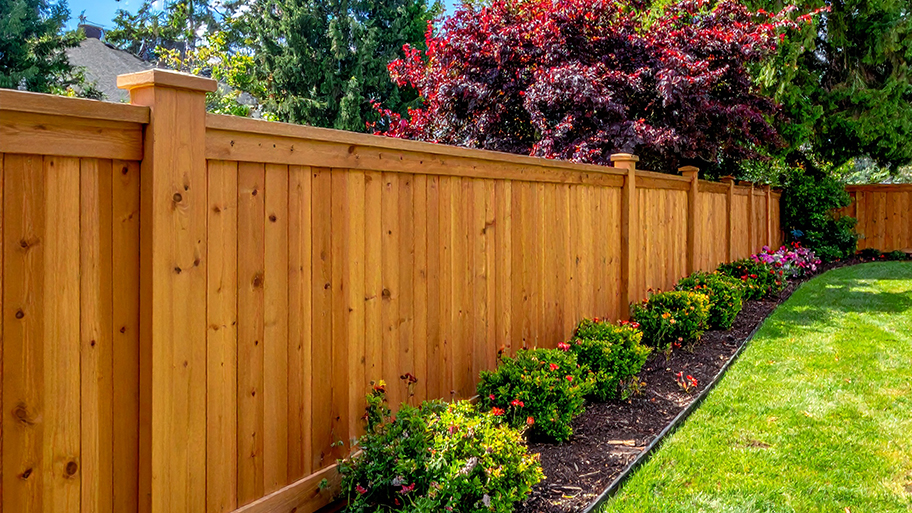
The cost to pressure wash a deck depends on its size, condition, material, and whether you DIY the job. Help set your budget with this cost guide.
The power (or the pressure) is yours


Both power washers and pressure washers use pressurized water to clean surfaces.
However, power washers use hot water, and pressure washers use regular-temperature water.
A power washer is more effective at removing stubborn stains (like oil or grease) and mold.
You can use a pressure washer to spruce up decks, patios, fences, gutter exteriors, and more.
Don’t use either machine on soft or fragile materials, like windows or light fixtures.
It’s possible—likely, even—that you’ve heard the terms “power washing” and “pressure washing” used interchangeably. There’s a major difference, though: Power washing uses hot water, while pressure washing doesn’t. So, which option is better for your cleaning job? Keep reading to learn when you should use a power washer versus a pressure washer.
When it comes to pressure washers versus power washers, the main difference is the temperature of the water. Simply put, power washers heat up the water before sending it out in a pressurized stream, but pressure washers use cool or regular-temperature water. Because of this, power washing is best for removing deep or difficult stains. Pressure washing is more versatile and useful for a variety of cleaning projects.

A power washer is a machine that uses hot, pressurized water and steam to deep-clean hard surfaces. The hot water helps break down grime and dirt buildup, which makes a power washer ideal for heavy-duty jobs like removing oil stains from a driveway.
| Pros | Cons |
|---|---|
| Efficient and effective | Pricier than a pressure washer |
| Can remove tough stains | Higher maintenance |
| Good for big jobs | Too powerful for some surfaces |
Best for:
Deep cleaning large, hard surfaces
Removing oil, grease, and other difficult stains
Getting rid of mold, mildew, algae, or moss
Power washing is a quick and effective way to deep clean hard surfaces. Thanks to the combination of hot water, steam, and pressure, a power washer can remove all kinds of stains and grime—including oil spills, mold, and chewing gum—better than a pressure washer.
Power washers are also more efficient than pressure washers, which makes them good for large cleaning projects. For example, if you need to clean a big concrete driveway, a power washer can help you get the job done faster.
Power washers are more expensive to buy and run than pressure washers. Not only do they require more power to produce hot water, but they also have a more complex design than pressure washers, thanks to the internal components that heat the water. Those extra parts make power washers harder to maintain, too.
Also, while a power washer is great for heavy-duty cleaning, it’s not necessary for most residential jobs. In fact, the heat and pressure can damage many surfaces, including wood siding or decking.

Like a power washer, a pressure washer also produces a high-pressure stream of water to clean many different surfaces. However, instead of heating the water, a pressure washer uses cold or room-temperature water to blast away dirt and debris.
| Pros | Cons |
|---|---|
| Less expensive | Not as effective against tough stains |
| Easier to maintain | Less efficient than power washers |
| Versatile | Can damage certain surfaces |
Best for:
Sprucing up wooden decks, patios, and fences
Cleaning brick or masonry
Stripping off old paint
Pressure washers are more affordable than power washers to buy, rent, and operate. Plus, since they have fewer components, they’re easier to maintain.
Pressure washers are also more versatile than power washers. You can only use a power washer on hard and durable surfaces, but there are many uses for a pressure washer around your home, including driveways, patios, stairs, decks, and gutters.
One drawback of pressure washing is that it isn’t as effective as power washing—especially when it comes to deep stains or mold. Pressure washers are also less efficient, so your cleaning job could take longer than it would with a power washer.
Even though pressure washing isn’t as harsh as power washing, it can still damage soft surfaces and fragile materials. Avoid using a pressure washer on glass, electric meters, air conditioning units, and other delicate items.
Not sure which type of washer you need? Let’s compare power washing versus pressure washing in a few key categories, including cost and cleaning capability.
A pressure washer is less expensive to purchase and operate than a power washer. Hiring a pro to pressure wash your home is also more affordable. On average, the price of professional pressure washing starts at $100, but power washing jobs start at $250.
With its combination of heat and pressurized water, a power washer can blast away oily and greasy stains better than a pressure washer can. (However, most cleaning projects don’t require that much power. Often, a pressure washer is enough to get the job done.)
"Identifying if stains are organic (like mold and mildew) or non-organic (like rust and oxidation) is very important before starting any power washing job."
— Fred Hodge, President and Co-Founder at Clearview Washing, Little Silver, New Jersey
If you wear appropriate safety gear and understand how to handle a pressure washer, it’s possible to do your own pressure washing. Power washing, on the other hand, is more dangerous and less DIY-friendly due to the high temperature of the water. To remove old or stubborn stains, we suggest calling a power washing pro near you.
From average costs to expert advice, get all the answers you need to get your job done.

The cost to pressure wash a deck depends on its size, condition, material, and whether you DIY the job. Help set your budget with this cost guide.

The cost to pressure wash a patio depends on the size of the surface and the type of patio you have, as well as whether you DIY or hire a pressure washing pro.

Pressure washing your fence can restore its appearance and keep your home looking great. Learn how much it costs based on factors like square footage and material.

What is pressure washing? It’s a quick way to get rid of built-up stains—but only under the right circumstances. Here’s when (and when not) to pressure wash.

Learn the various ways to remove small and large areas of paint from concrete, including soda blasting, paint strippers, power washing, and more.

Who power washes houses? Hiring a power washing professional is the best choice, as this expert has the know-how and equipment to do the job correctly.